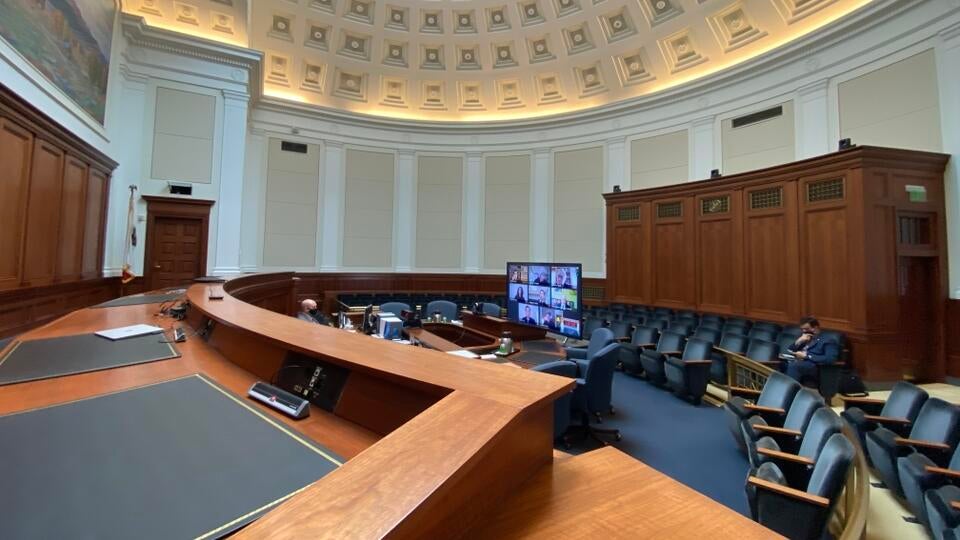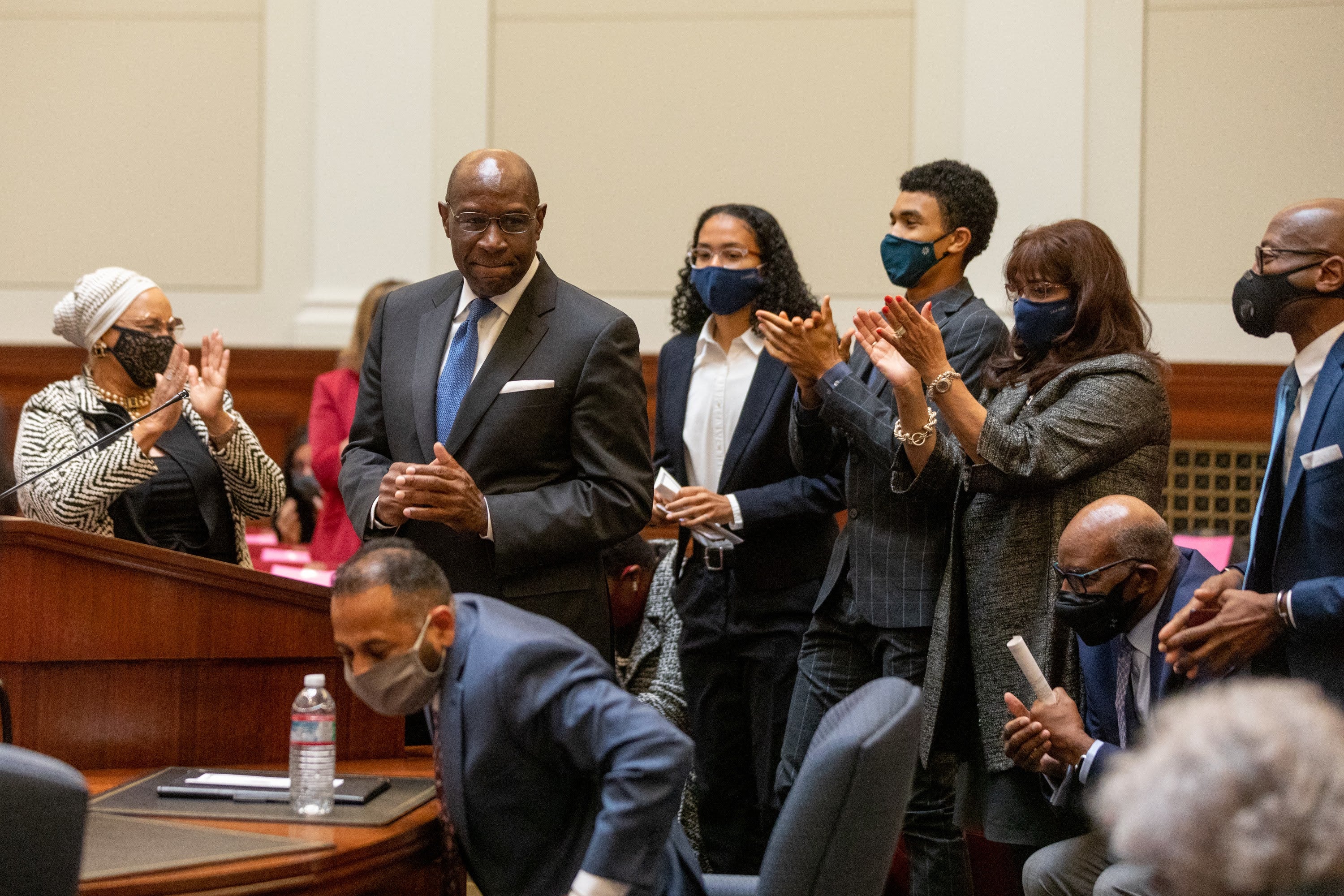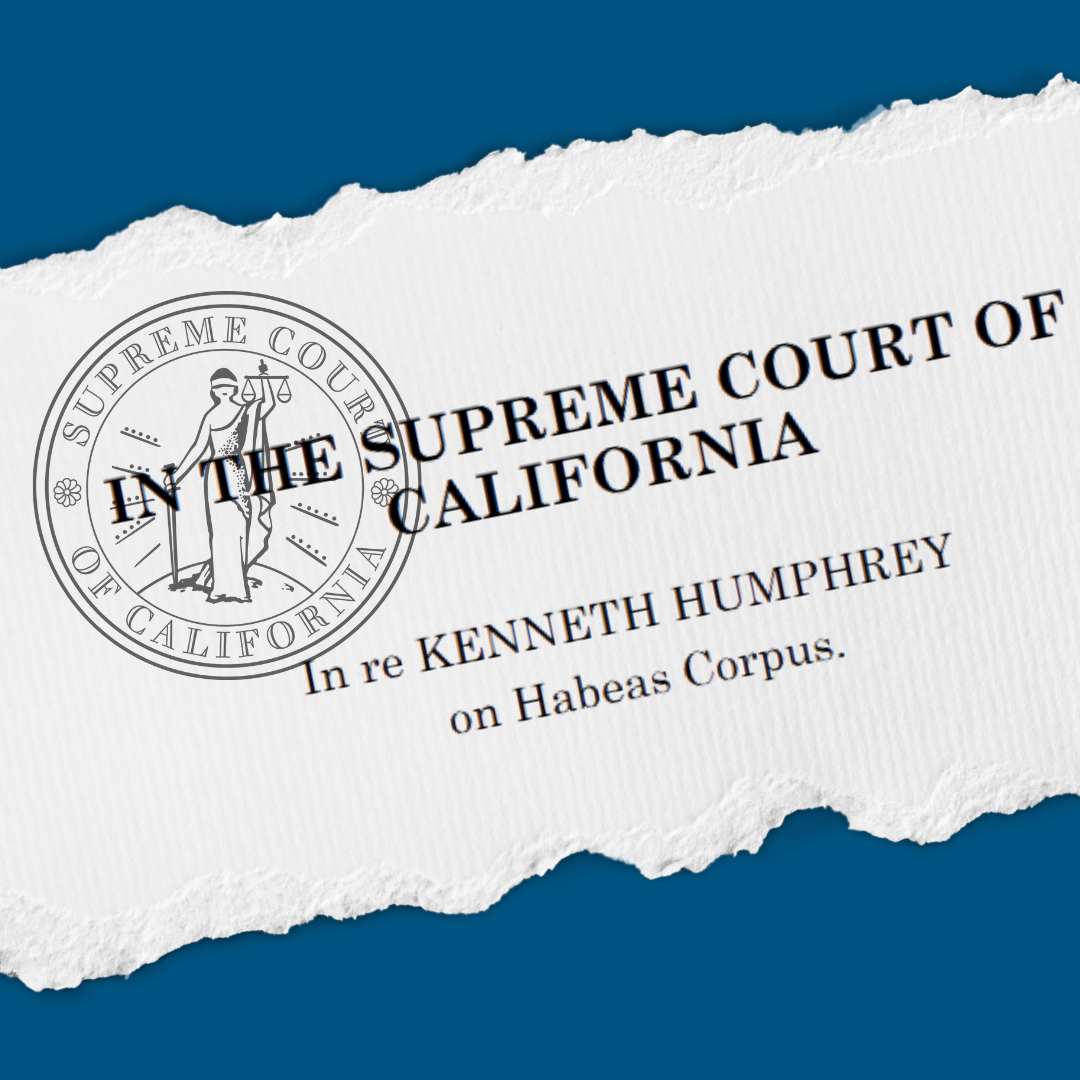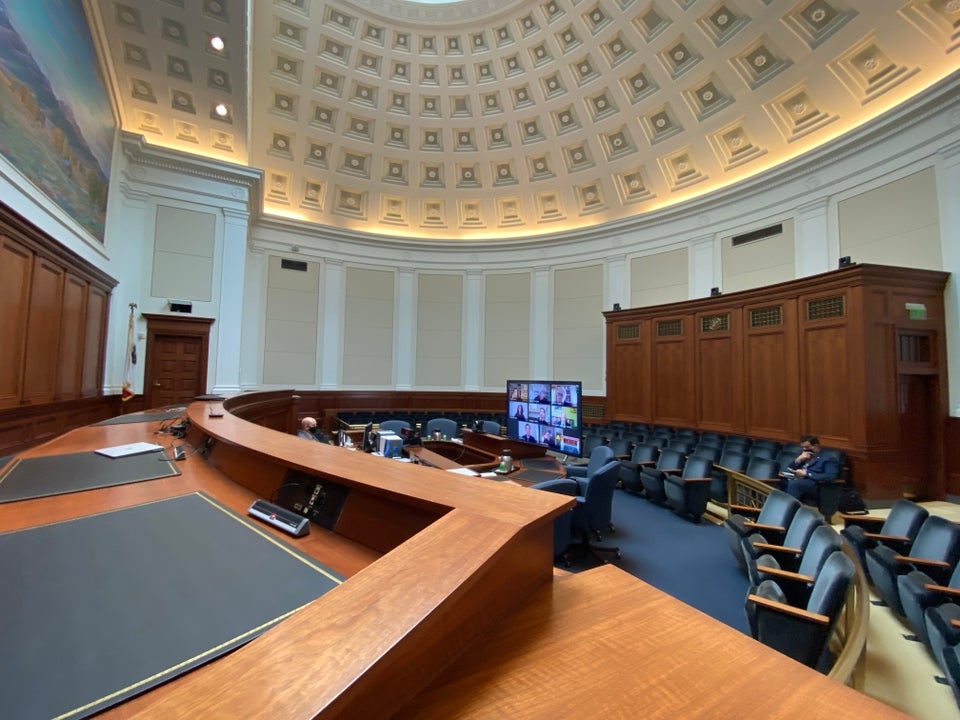
Year in Review: California Supreme Court
A New Justice Takes the Bench
Justice Martin Jenkins’ appointment to the California Supreme Court made him the first openly gay member, and the third Black man, to serve on the court.
But his career had already been a distinguished one. Immediately before his nomination to the state’s high court, Justice Jenkins was Gov. Gavin Newsom’s judicial appointments secretary, helping to identify and select judicial officers statewide. He previously served as a judge on the Alameda County Municipal Court, that county’s Superior Court, the federal district court in San Francisco — and as a justice with the First District Court of Appeal in San Francisco.
Prior to becoming a judge, he worked as an attorney for the U.S. Department of Justice and served as in-house counsel for Pacific Bell. And before all that, he had a preseason stint in the NFL as a cornerback for the Seattle Seahawks.

Justice Martin Jenkins at his confirmation hearing. See the full album.
The Work of the Court
The California Supreme Court issued 55 majority written opinions during the September 2020–August 2021 court year (see chart and "High-Profile Cases" below).
The court acted on 6,611 filings, including 3,985 petitions for review from California’s six appellate court districts. The court considered and filed orders resolving scores of emergency petitions that raised claims concerning COVID-19 conditions in jails and prisons, postponement of legal proceedings, and other pandemic-related issues.
Remote Oral Arguments Continue
As the COVID-19 pandemic persisted, the court continued to hold oral argument sessions remotely. The court launched its first remote hearing in April 2020, just weeks after issuance of Governor Newsom's statewide shelter-in-place order. There have been 16 remote oral argument sessions with no major logistical issues, according to the court’s Clerk/Executive Officer Jorge Navarrete.
“The court has received positive feedback about the process,” he added. “Counsel who have argued before the court appreciate the IT support, which includes a pre-session test run, as well as support during the session.”
Honoring Justice Cruz Reynoso
The court held a special session to honor the passing of Justice Cruz Reynoso (Ret.), the court’s first Latino Supreme Court justice.
A son of migrant farmworkers, Justice Reynoso authored the landmark decision in People v. Aguilar, in which the court found that non-English speaking people who are accused of a crime have the right to a translator during the entire court proceedings.
As is traditional, each sitting justice spoke at the session, and the court heard remarks from four additional speakers, including former Justice Joseph Grodin.
An Alternative Pathway to Licensure
Hundreds of law school graduates with qualifying bar exam scores became able to work as fully licensed attorneys after completing 300 supervised practice hours, under an order issued by the court in January.
The court created the “Provisional Licensure Program” in October 2020, after the COVID-19 pandemic forced delay of the bar exam. The court’s January order temporarily expanded the program to include those who scored 1390 or higher on any California Bar Exam between July 2015 and February 2020.
Clarifying the Precedential Effect of Court of Appeal Opinions
The court issued an order clarifying that after it grants review of a published Court of Appeal opinion, the underlying appellate decision may have precedential effect in the trial courts. Under this order, a trial court faced with conflicting published appellate decisions now can decide, while the Supreme Court is considering how to resolve the conflict, which approach is best to follow until the Supreme Court rules on the lead case.
High Profile Cases
- In a closely watched case, the court found it unconstitutional to keep a defendant in jail merely because that person cannot afford bail. The court concluded there must be “clear and convincing” evidence that there are no other ways — such as electronic monitoring, regular check-ins with a pretrial case manager, or drug and alcohol treatment — to protect the public and ensure a defendant will return to court (In re Humphrey).
- The court upheld a state law that banned 14- and 15-year-olds from being prosecuted in adult court, where they might face sentences up to life in prison. The court found the law to be consistent with Proposition 57, which requires prosecutors to start all juvenile cases in juvenile court. The court determined the challenged law furthers the “fundamental purposes of promoting rehabilitation of youthful offenders and reducing the prison population” (O.G. v. Superior Court).
- The court, in a case regarding eyewitness testimony, addressed whether it is appropriate for a judge to instruct the jury to consider how “certain” a witness was concerning what that witness saw. Although the court upheld the judgment in this case, it referred the matter to the Judicial Council to assess whether the instruction should be revised in light of the current understanding of the significance of eyewitness testimony. “Eyewitness confidence is generally an unreliable indicator of accuracy,” the court wrote, explaining that the current instruction “has the potential to mislead jurors” (People v. Lemcke).
- The court upheld established procedures governing the deliberative process for jurors in capital cases. The court confirmed jurors need not agree unanimously on the specific “aggravating circumstances” that support a death sentence, nor must jurors reach their conclusion “beyond a reasonable doubt” when deciding whether death is the appropriate penalty (People v. McDaniel).
Summary of Key Court Year Statistics
[September 1, 2020 – August 31, 2021]
|
Action/Category |
Number |
|---|---|
|
Opinions |
55 |
|
Civil Cases |
23 |
|
Criminal Cases |
17 |
|
Death Penalty Cases |
15 |
|
Filings |
6,409 |
|
Petitions for Review |
3,896 |
|
Civil Appeals & Writs |
991 |
|
Criminal Appeals & Writs |
2,904 |
|
Death Penalty Appeals & Writs |
1 |
|
Original Proceedings |
2,513 |
|
Civil Writs & Other Matters |
258 |
|
Criminal Writs & Other Matters |
1,441 |
|
Executive Clemency |
7 |
|
Death Penalty Appeals & Writs |
6 |
|
Death Penalty Habeas Corpus |
14 |
|
State Bar Matters |
787 |
|
Dispositions |
6,611 |
|
Petitions for Review |
3,985 |
|
Civil Appeals & Writs |
1,007 |
|
Criminal Appeals & Writs |
2,977 |
|
Death Penalty Appeals & Writs |
1 |
|
Original Proceedings |
2,626 |
|
Civil Writs & Other Matters |
243 |
|
Criminal Writs & Other Matters |
1,522 |
|
Executive Clemency |
23 |
|
6 |
|
|
Death Penalty Habeas Corpus [Transferred] |
9 |
|
State Bar Matters |
823 |
|
Death Penalty Habeas Corpus |
|
|
Court of Appeal Opinions |
|
|
Court of Appeal Opinions |
|


